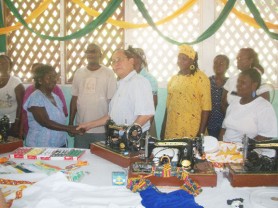The Linden Salvation Council (LSC) plans to assist as many underprivileged persons as it could in Region Ten and counts its alliances with government and two other charities as a boon to fulfilling this mandate.

Since its resuscitation earlier this year the LSC said, its collaboration with government, Food for the Poor (Guyana) (FFTP) and the Church of Jesus Christ of Latter Day Saints has allowed it to respond to many needs and it is currently implementing a training element to its programme to equip residents with a skill.
The partnership with FFTP came at a time when the international donor agency was challenged to reach those most in need in the region and had encountered problems with accountability. In fact, FFTP Executive Director Leon Davis had said that the charity had failed miserably after having attempted to work with several organisations in Linden and just as it was preparing to single-handedly manage distributions in the community, the LSC sought an alliance.
LSC Head Phillip Bynoe is passionate about serving the region’s most underprivileged citizens. He said after a five-year dormancy, the council was revitalised at a time when there was a need for comprehensive programmes to being relief to residents. “The LSC was successful in bringing together people of various ethnicities, political persuasions and religions who had a passion to serve their various communities and in this regard we were able to win the confidence of the organisations that we have formed alliances with,” he said.
To effectively meet the mandate of Food for the Poor, the LSC has spearheaded the formation of the Linden Food for the Poor Committee which has a wide cross-section of representatives. This committee in turn set up 24 sub-committees within the various wards of Region Ten reaching as far as Coomacka up the Demerara River and Bamia on the Linden-Soesdyke Highway. These sub-committees have been tasked with maintaining transparency as they serve every needy member of their communities. A comprehensive needs assessment was done in every ward.
“Our involvement with Food For the Poor…is not only centered around the distribution of clothing and food items to people but it has an agenda of spearheading the start-up of economic activities which would empower residents giving them the tools that would see them being independent…,” Bynoe said. To facilitate this LSC has hosted a sewing programme for women, livestock farming, and computer literacy programmes and others.
The sewing programme was the first to get off the ground when the committee acquired nine sewing machines: eight from FFTP and one from Public Service Minister Dr Jennifer Westford who also contributed 21 bolts of cloth. Davis and FFTP representative Paul Chan-A-Sue commissioned the programme on Tuesday.
In his address to the first sewing class of women who were drawn from across the region, Davis said the FFTP was happy that its alliance with the LSC has been successful. “What we did this time is to ensure that we did it in a more professional way; in a way that everybody understands the role that Food for the Poor would play and the role that Linden Salvation Council would play,” he said.
Davis also said he had met Bynoe and another committee member in Georgetown to clarify a few issues and he was pleased with the distribution system the LSC had implemented. He said the FFTP is considering adapting it for communities across the country. Davis also said the computer promised to the Linden community will be delivered within a month. He also said that much emphasis would be placed on development as it has become necessary regarding the changing fortunes of Linden.
Additionally, Chan-A-Sue suggested that livestock rearing is as another economic activity that has the potential to be successful, self sustaining and one which FFTP is ready to support once the local organisation secures the land to execute it. “The chicken has worked for us… and with good management you should be able to [execute such a project],” he said. Chan-A-Sue also challenged residents to start planning for the long term and to consider planting permanent crops before outsiders enter the community and implement such a project.
He also alluded to the FFTP’s interest in providing medical supplies as it is often the recipient of large quantities of such items which often expire before the main medical institutions can use them. He said this was the impetus for the FFTP conducting medical outreach exercises and identifying a few health centres which accept the supplies.
Through its collaboration with the Latter Day Saints and FFTP the LSC has distributed about 18 wheelchairs and cloth and foodstuff to more than 70 shut-ins in the region. The mobile exercise which was funded by the LSC inspired the group and it hopes to be able to continue this exercise as the response was overwhelming. Several persons became emotional when relating stories of gratitude from recipients. “I was moved to tears when we went to… one home where a child who received a wheelchair held on to my hand and looked me straight in the eyes and kept saying thank you in his vocally challenged language,” a team member said.
Another team member recalled that an elderly woman had begged them to sit and chat with her since most of the time she has no one to talk to. The woman cannot move around freely and sometimes a number of days would go by before she would see anyone to chat with. “It is for these reasons that we will continue our acts of benevolence with whatever resources are made available,” Bynoe said, adding that he realises that “we cannot totally heal the world but what we know and are committed to is healing when and where we can for as long as our time on earth would allow us.”









